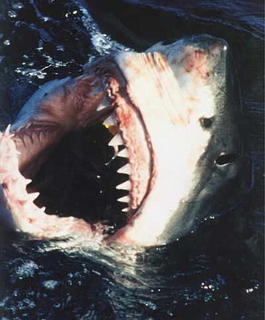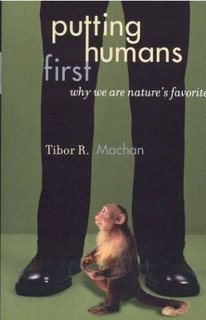A man was killed over the weekend in a horrific shark attack off the northern coast of New South Wales.
"We believe it was a very large shark," Detective Inspector Lindsay said.
The victim was sitting on his surfboard when the shark came up beneath him, taking off both of his legs and pulling him off his surfboard, he said... "For a shark to take the board and the person sitting on it, it's got to be very big.” …
Richard [the manager of a local surf shop] said the frequency of shark attacks in the area was "getting crazy.""Every week we get someone knocked off their board or nipped, it's getting ridiculous," he said.
This is the seventh fatal unprovoked shark attack in Australia in four years by large, legally-protected Great White Sharks.
Here in NZ, which has a relatively high incidence of unprovoked shark attacks, Great Whites last killed a man as recently as 2013.
Despite the horrors, the the man-eating Great White Pointer remains a protected species both in Australia, and New Zealand, where it has been protected since 2006.
This means that folk can hunt for the sharks after an attack, but do nothing to it either before or after.
As I said when Chris Carter so cavalierly added the Great White to the Department of Conservation’s list of protected species, it is a policy conserves everything except human life.
In that, it is part of a context that is much bigger than the graphic savagery of a human being becoming a meal for an ocean predator.
It is a part of a context that directly pits the anti-concept of 'intrinsic values'-- which environmentalists employ to say things should be protected 'as is, where is'—against the value of human life: from which all real value is actually derived.
This isn't just a semantic argument, as you’ll soon discover if one of these protected Great Whites starts chewing through your surfboard. Or your arm. Or your loved one.
A similarly stupid three-decade Australian ban on hunting crocodiles has seen numbers jump from 5,000 to 70,000, and an increase in savage croc attacks.
David Graber, research biologist with the US National Park Service, once declared on behalf of mainstream environmentalism that “We are not interested in the utility of a particular species or free-flowing river, or ecosystem, to mankind. They have intrinsic value, more value—to me—than another human body, or a billion of them... Until such time as Homo Sapiens should decide to rejoin nature, some of us can only hope for the right virus to come along.” City University of New York philosophy professor Paul Taylor adds: "[T]he ending of the human epoch on Earth would most likely be greeted with a hearty 'Good Riddance.'"
Graber gives the game away by declaring the notion of 'intrinsic values' itself to be valuable to him: as trees, rocks and mud puddles can’t speak for themselves, environmentalists like Graber must be paid to do it for them. (Idiscussed this phenomenon the other day.) Responding on behalf of human beings, Glenn Woiceshyn argues:
While extreme, these anti-human sentiments are logically consistent with environmentalism's "intrinsic value" philosophy: Since man survives only by conquering nature, man is an inherent threat to the "intrinsic value" of nature and must therefore be eliminated. Environmentalism makes man the endangered species. The only antidote to these haters of mankind and their anti-human philosophy is to uphold man's right to pursue his own life by means of his productive activities.The real endangered species, says Michael Berliner, is us:There is a grave danger facing mankind. The danger is not from acid rain, global warming, smog, or the logging of rain forests, as environmentalists would have us believe. The danger to mankind is from environmentalism.
The fundamental goal of environmentalists is not clean air and clean water; rather it is the demolition of technological/industrial civilization. Their goal is not the advancement of human health, human happiness, and human life; rather it is a subhuman world where "nature" is worshipped like the totem of some primitive religion.The history of how a love of nature has turned into a preservationist religion is traced briefly here by Robert Bidinotto. Chris Carter's announcement is just one more example of that policy: Protecting a killer as some sort of 'totem' is a clear threat to the rest of us.
Fortunately, one person at least came out against Carter's stupidity. Me.
Of course, few listened. The shark was protected as an intrinsic value, and human beings were placed second.
To paraphrase from Monty Python, the idea that nature has intrinsic value means:
Every tree is sacred,
Every worm is great,
If a dune is built on,
Greens get quite irate.
Every bush is wanted,
Every virus good,
Every shark is needed,
in your neighbourhood.
But a love of nature does not require putting viruses and sharks first and humans second. There are good folk arguing that a love of nature can be put in its place—which has to begin by recognising the source of value, by abandoning the phony notion that pristine nature is sacred, and especially overcoming the destructive concept of intrinsic value, i.e., that nature (or anything) can have value without a valuer – that is, that it can have value in and of itself regardless of who is around (or not) to value it.
Which means (as I also argued back in 2005) repudiating the “deep ecology” insanity that puts humans at the bottom of the totem pole, and embracing instead an environmentalism that accepts humans as first in the hierarchy of nature.
That’s not easy, not when
fully a fourth of all Americans "see nature as sacred, want to stop corporate polluters, are suspicious of big business, are interested in voluntary simplicity, and are willing to pay to clean up the environment and stop global warming." That's one quarter of Americans who see nature as sacred, just as the deep ecologists do.
It's true that there is now a growing tension between those who sympathise with the view of the deep ecologists--what you might call the 'romantic' or 'religionist' environmentalists-- and a growing minority who have reversed their views on issues of population growth, urbanisation, genetically engineered organisms, and nuclear power (as I discuss in a 2005 blog called 'Religionists for Nuclear.'), but this latter group is not yet in the environmental mainstream, although they do deserve to be.On this question of who comes first though, consider the case of Florida boy Jessie Arbogast, whose arm was bitten off by a shark. It's easy to agree (or to maintain a discreet silence as animal rights activists did) with the shark being shot so the arm could be retrieved and successfully reattached (but do note that shooting a shark teven to save an arm would be illegal in both Australian and NZ) .
That's an easy case with which to agree, or it should be, and the justice of shooting the shark and retrieving the boy's arm should be obvious, as Tibor Machan quite properly points out:Few among us would have hesitated at this choice: boy's arm versus life of shark. Of course the boy's arm is more important, and so the shark had to go. Yet, there are millions of animal-rights advocates around the world, many of them Hollywood celebrities with easy access to talk shows and news reporters, who have remained completely silent about their professed view—namely, that human beings are not more important than non-human animals.But consider Tibor's further point. An environmentalism that honestly puts humans first would go further and apply the same principle applied correctly to secure the boy's survival and well-being to all the day-to-day activities human must undertake to secure their livelihood: Rather than seeking to shackle human production and fecundity, they must recognise that the unique nature of human beings requires that they use, alter and sometimes despoil nature in order to maintain their lives and to produce wealth: no other means of livelihood is possible to the human animal.
Supporting human life then means opposing the 'religious' environmentalism that is often economically devastating to farmers, fishers, miners, loggers, and others who necessarily 'despoil' untrammeled nature in the necessary pursuit of their, and our, livelihood.
So that's the challenge I put to you: do you agree that humans should be put first in the hierarchy of nature? And if so, do you agree with my conclusion here; that is, in an "environmentalism ... that...eschews any idea of 'intrinsic values' or deep ecology, and embraces instead the idea of seeking and advancing those environmental values that support and enhance human life."
This is not a “pave the world” argument. It is moving from the extremism of saying that nature-has-rights-but-humans-don’t – to putting humans second simply because we are human – to giving us a true hold on the planet.
Alex Epstein from the Center for Industrial Progress (CIP) summarises the correct approach
Politically, the so-called environmentalist movement has put forward the myth that a better environment means authoritarian control by environmental bureaucrats who prioritise sloths over human beings. CIP shows that a better environment means clear, scientific laws that protect both the right to develop and the right to preserve clean air and water.
Are there really and truly environmentalists that don't put humans first, I hear you ask? Human beings who demand that put viruses, rocks and mud puddles be put ahead of human beings? Well, yes there are. I quote two above. I quoted many more here.
As I say here, I'm sure we can all embrace an "environmentalism ... that...eschews any idea of 'intrinsic values' or deep ecology, and embraces instead the idea of seeking and advancing those environmental values that support and enhance human life."
A property-rights based environmentalism putting humans first is such a beast.
Good reading on this important subject here:
- Tibor Machan’s take on Shark versus Boy
- George Reisman's classic 1990 heads-up: 'The Toxicity of Environmentalism.'
- Tibor Machan's excellent ethical challenge: Putting Humans First: Why We Are Nature's Favorite.
- Elizabeth Brubaker's masterful online book, Property Rights in the Defence of Nature.
 "We believe it was a very large shark," Detective Inspector Lindsay said.
"We believe it was a very large shark," Detective Inspector Lindsay said. 
No comments:
Post a Comment